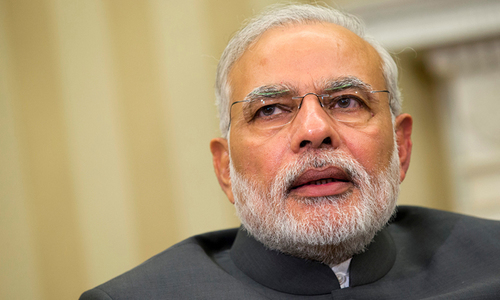India's government unveiled on Friday a raft of budget sweeteners for farmers, the middle class and also cows, as Prime Minister Narendra Modi seeks to shore up support with elections looming.
Thousands of farmers hit by low produce prices, crippling debt and volatile weather have killed themselves in recent years, which along with rising joblessness has hit Modi's popularity.
The announcement of a new national cow board for bovine welfare was meanwhile a nod to India's majority Hindus — Modi's voter base — who believe the animals are sacred.
“This government will never shy away from honouring our mother cow,” a hoarse Piyush Goyal, interim finance minister, told a raucous parliament as he unveiled the interim budget.

The budget was the last before the country of 1.25 billion people, Asia's third-largest economy and the world's biggest democracy, goes to the polls in elections due by May.
The opposition has been emboldened by a series of state election victories late last year, including in the “cow belt” region of northern India that propelled Modi to power in a landslide in 2014.
Modi and his Hindu nationalist Bharatiya Janata Party (BJP) promised to create millions of jobs and to help India's urban middle-classes, who are traditional supporters of his right-wing BJP.
Read next: BJP turns up Hindu nationalist heat with renamings, statue plan
But a crisis in Indian agriculture, rising joblessness and difficulties for the middle class have dented Modi's image.
On Thursday the Business Standard published what it said was an official report buried by Modi's government showing unemployment at 6.1 per cent, the highest since 1972-3.
The government dismissed the report, saying the data had not been finalised yet.
Direct handouts
Goyal said that 120 million “small and marginal” farmers will receive direct annual handouts of around 6,000 rupees ($85), costing the government the equivalent of around $10.5 billion.
The dole out appeared to be in response to a proposal announced by the main opposition Congress party on Monday, promising a minimum income guarantee to the poor.
Other new budget measures include a full tax rebate for those earning up to $7,000, providing a tax benefit of some $2.6 billion to an estimated 30 million people in the middle class.
The government would also launch a pension scheme for people working in the country's vast unorganised sectors, where employment terms are not fixed.
“Under the visionary leadership of honourable Prime Minister Shri (sir) Narendra Modi, we have given the most decisive, stable and clean government and have undertaken transformational structural reforms,” he said.
“I can proudly say that India is solidly back on track and marching towards growth and prosperity. We have prepared the foundation for sustainable growth, progress and better quality of life for all our people.”
Analysis: Indian state polls spell setback for Modi, boost for Congress
He also predicted that India's $2.3-trillion economy would more than double in size in the next five years. “We are moving towards realising a new India by 2022,” Goyal said.
“We are poised to become a $5-trillion economy in the next five years and we aspire to become a $10-trillion economy in the next eight years.”
Ashutosh Datar, an independent economist, said the budget was “fairly political” and a plan to woo voters.
“Young voters, traders, farmers and the middle-class will definitely be lured by the announcements and also benefit from them,” he told AFP.
But Rahul Gandhi, head of the Congress party, tweeted: “Five years of your incompetence and arrogance has destroyed the lives of our farmers.
“Giving them (17 rupees) a day is an insult to everything they stand and work for.”














































